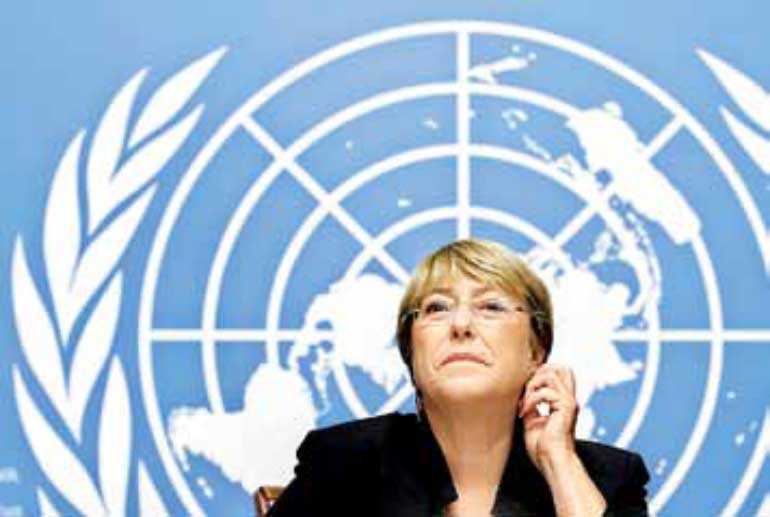Thursday Feb 19, 2026
Thursday Feb 19, 2026
Tuesday, 9 March 2021 02:11 - - {{hitsCtrl.values.hits}}

UN High Commissioner for Human Rights Michelle Bachelet
 There were two bizarre and ‘idealistic’ articles, to say the least, published in the Colombo Telegraph (CT), one after the other, giving some prominence, one by a gentleman (Ranjith C. Perera) and the other by a lady (Rohana Jayaratne), quite detrimental to the independence, territorial integrity, sovereignty, and interests of the common people of the country. Jayaratne’s article subsequently published in the Daily Financial Times.
There were two bizarre and ‘idealistic’ articles, to say the least, published in the Colombo Telegraph (CT), one after the other, giving some prominence, one by a gentleman (Ranjith C. Perera) and the other by a lady (Rohana Jayaratne), quite detrimental to the independence, territorial integrity, sovereignty, and interests of the common people of the country. Jayaratne’s article subsequently published in the Daily Financial Times.
The timing of these two articles is rather dubious given the UK initiated draft resolution before the Human Rights Council, with intimidated economic sanctions, and threatened prosecutions against some high officials to be executed in foreign lands, if not before the International Criminal Court (ICC).
Contempt to home country
The title of the first article appears radical, “UNHCR [sic] Should Focus on the Sovereignty of the Oppressed, Not the Oppressors.” Why sic? Although he means United Nations Human Rights Council (UNHRC), he says UNHCR (United Nations High Commissioner for Refugees!). The title is radical because he apparently talks on behalf of the oppressors! The general tendency of the author is to consider everything he dislikes as human rights issues! This is very clear from the following sentence.
“Besides the human rights questions related to 30-year civil war, 2021 preliminary report sent to Sri Lanka, it is reported prominent charges have been raised on the 20th Constitutional Amendment, military appointments to civil administration, etc. by the new Government that came into power one year ago.”
The other tendency is to take all what the High Commissioner has said as the ‘gospel truth’. It may be the case that the author is allergic to the present Government and the 20th Amendment. However, that should not be a reason to believe or support what is in the High Commissioner’s Report lock, stock, and barrel. There is no critical perspective given perhaps due to his political bias. The most extreme or ‘idealistic’ is what he talks about sovereignty.
After condemning many Asian, African, and Latin American governments, he proposes “Therefore, it is high time international organisations such as UN and UNHRC should adopt a more realistic definition to the word ‘sovereignty’ …On that basis the international organisations focus would be of the ‘sovereignty’ of the people or oppressed not of the rulers or oppressors.”
Question of sovereignty?
Perhaps he is unaware or forgotten the Article 3 of our Constitution which says, “In the Republic of Sri Lanka sovereignty is in the people and is inalienable. Sovereignty includes the powers of government, fundamental rights and the franchise.” Of course, there can be a difference between the constitutional theory and practice in any country. But that cannot be resolved by pleading to foreign countries or the UN. What the UN defines in terms of sovereignty is the following in Article 2(1) and 2 (7).
Article 2 (1): “The Organisation is based on the principle of the sovereign equality of all its Members.” This means the countries like Sri Lanka, whether this equality principle is practiced by the UN or not.
Article 2 (7): “Nothing contained in the present Charter shall authorise the United Nations to intervene in matters which are essentially within the domestic jurisdiction of any state or shall require the Members to submit such matters to settlement under the present Charter; but this principle shall not prejudice the application of enforcement measures under Chapter Vll.”
Under the Charter, the UN or its agencies cannot ‘intervene in matters which are essentially within the domestic jurisdiction of any state.’ The exception is in the case of ‘action with respect to threats to the peace, breaches of the peace, and acts of aggression’ in Chapter VII. However, decisions in this regard should be taken not by the UNHRC but by the Security Council, when and if necessary. The author’s many references and particularly references to other Asian, African, and Latin American countries show that his views do not emerge from idealism, but outright colonial mindset.
Second article
The second article by the lady is more subtle but of the same genre. It is titled ‘How Can Sri Lanka Successfully Overcome the Challenge of the UNHRC Resolution?’
To be sure, so far there is no resolution from the UNHRC, but allegedly a draft resolution from a Core Group led by the UK, our former colonial master. I have expressed my doubts before whether any resolution at the UNHRC could be democratically approved at the current session which is conducted virtually online which gives undue advantages to rich countries against the poor countries.
The article gives a fair description of the UN organisations and the UNHRC, but quite blind to its failures. It asks, “In the above context, can Sri Lanka question the integrity of the UNHRC, an important arm of the UN, and thereby condemn the very foundation that it was built on?” However, to the best of my knowledge, Sri Lanka or any other country has not questioned the foundations of the UN (but perhaps the UNHRC!), but validly questioned the terrible failures, partiality, and duplicity of the High Commissioner’s report and the double standards of the UK initiated draft resolution.
The article says, “In her January 2021 report, Bachelet called for an International Criminal Court investigation into Sri Lanka’s Tamil separatist conflict…” This is simply not true. Bachelet’s report never mentions a ‘Sri Lanka’s Tamil separatist conflict’ or even I would not blame the whole Tamil community for that separatist war or separatist terrorism in the country. The problem with Bachelet’s report exactly is that she never accepts ‘separatism’ or ‘terrorism’ for Sri Lanka’s past or present problems.
Bizarre recommendations
The main concerns about the article are in the 12 recommendations that it prescribes. As a way out of the UNHRC challenge, she propagates that “noncompliance is not an option for a weaker nation in the global context of superpower competition”.
This is a defeatist and colonial mindset. She repeatedly talks about ‘weaker members’ and ‘weaker nations like Sri Lanka’ in her article. She admits that some of the previous UNHRC recommendations are already in operation and they could be and should be expedited. However, that should not be done just because of the pressure, bullying or threats from the superpowers on the Western side.
Let us look at some of the controversial recommendations more specifically. Look at the number 4 which says, “Avoid confrontation with international media and countries supporting the resolution which can further harm Sri Lanka’s image as they are too powerful force to reckon with.”
What is recommended here is the meekness on the part of Sri Lanka. This is the same as what some of the Colombo based NGOs propagated before May 2009 arguing that the LTTE ‘cannot be militarily defeated’ and therefore their demands should be adhered to.
The article also questions the ‘sovereignty of the country’ like the first author in the following manner: “The outdated concept of state sovereignty is of little or no relevance any more in a globalised and interdependent world with porous State borders due to rapidly expanding and instant communication via ICT.”
This could have been considered ‘idealism’ if it were argued separately as an opinion. But arguing for giving up sovereignty in the context of threats from the imperialist countries like Britain, USA or even Germany is quite opportunism and colonial mind set coming from an apparent Sri Lankan. The article goes on touching on another sensitive question for the Sri Lankans as below.
“The concept of Unitary Status in a geographically defined multiethnic polity, by nature of its centralised control, is flawed because it tends to be detached from the interests of minorities in deference to the majority leading to inequitable socio-economic development.”
This kind of an opposition to the concept of ‘unitary state’ coupled with talking about ‘porous state borders’ not only promotes the disintegration of the state, political system, and the socio-economic development of the country, but also invites foreign trained and assisted terrorism back again to the country. We have already seen some glimpses of this phenomenon re-emerging in April 2019 not because of globalisation, but because of the neglect of national security and people’s security on the pretext of globalisation by the last Government.